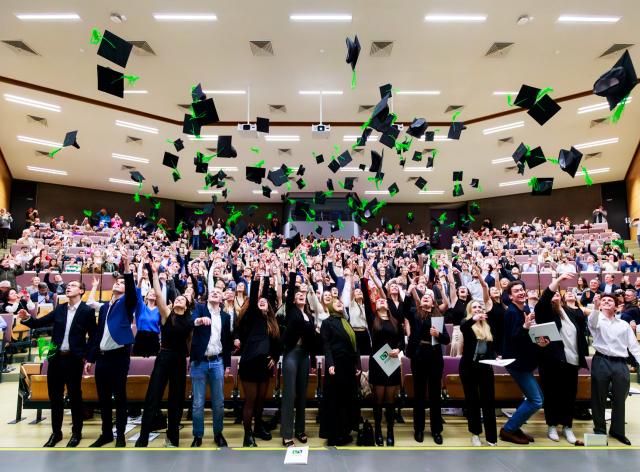The Faculty Economics Management Communication Politics (EMCP) has hosted many events over the course of its history. Here's a look back at some of our Faculty's most memorable moments.
60 years of the Faculty
In October 2022, the Faculty celebrated its 60th anniversary. To mark this anniversary, the Faculty organized two major events that gave everyone the opportunity to get together and share backgrounds, experiences, talents and memories!
On October 13, a conference-debate around the theme "New school rhythms: At university too?" in the presence of the Minister of Higher Education and party representatives. The debate was moderated by Béatrice Delvaux (Chief Editorialist, Le Soir). The full conference-debate is available on Youtube.
On October 15, an anniversary evening around the theme "La Faculté a des talents". Alumni, professors, researchers and students pitted their talents against the challenges of today and tomorrow: entrepreneurship, sustainable development, digital transition and innovative pedagogies were on the menu of a colorful academic session. The academic session was followed by a festive and convivial evening featuring cocktails, a meal and an after-dinner. All photos of the event are available on the phototheque.
Discover the souvenir video of the event here :
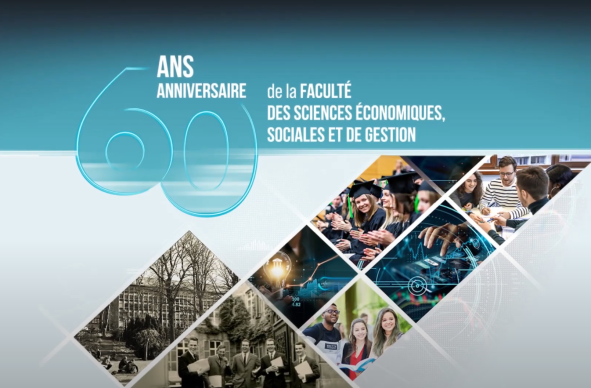
Baccalaureate graduation ceremony
On February 16, 2024, the graduation ceremony for the Bachelor of Information and Communication, Management Engineering, Economics and Management and Political Science programs took place. The ceremony was followed by a "verre de l'amitié", served by the Cercle des étudiants, bringing together graduates, their families and members of the Faculty's staff. The ceremony marked the crowning of several years of effort and sharing, both for students and their loved ones and for staff members.
Reforming Belgium" symposium
On October 10, 2023, a colloquium around the theme "Faut-il réformer la Belgique" was held at the Faculty of Economics, Social Sciences and Management. This featured various panels and also a political debate between representatives of the six parties of the Fédération Wallonie Bruxelles and moderated by Arnaud Ruyssen (RTBF).
Spotlight
News
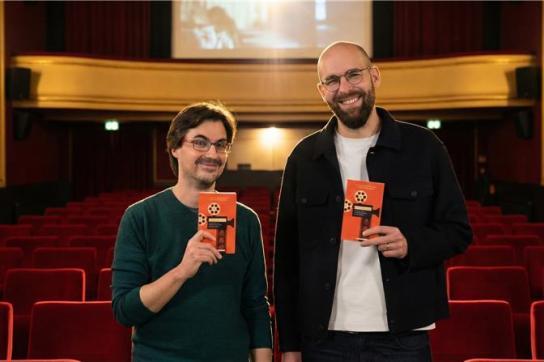
Twenty films to understand digital technology: a fun challenge taken up by two experts from UNamur
Twenty films to understand digital technology: a fun challenge taken up by two experts from UNamur
Terminator to talk about AI? Wall-E to talk about technological dependence? The Truman Show to discuss social media? In a new book, two professors from UNamur, Anthony Simonofski (digital transformation—EMCP Faculty—NaDI Institute) and Benoît Vanderose (software engineering—Faculty of Computer Science—NaDI Institute), take readers on a journey at the crossroads of digital technology and cinematic imagination.
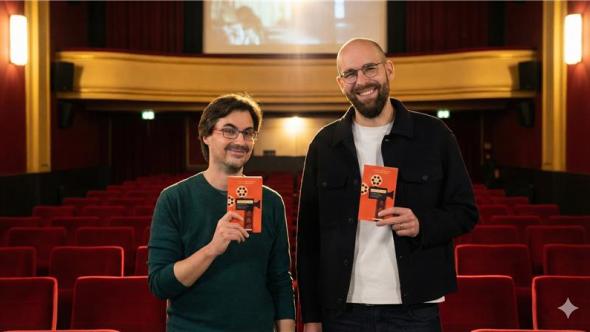
Their book "Cinématech - Twenty Works to Understand Digital Technology" is primarily educational in nature, as it allows readers to better understand digital technology and its challenges. But the originality of the approach chosen by the two authors makes it both entertaining and informative.
"The idea is simple: use 20 films and series to illustrate the history of digital technology, three important technologies (AI, robotics, XR) and their challenges. To do this, we start with Terminator, Her, Wall-E, Minority Report, and many others to make these subjects accessible," explains Anthony Simonofski, Professor in the Faculty of Economics, Management, Political Science, and Communication (EMCP).
Published by the Royal Academy of Sciences, Letters, and Fine Arts of Belgium, the book is an extension of the Pop-Code podcast produced by the two experts and film buffs. In it, they explore the use of pop culture to educate people about digital technology, while examining its challenges and limitations.
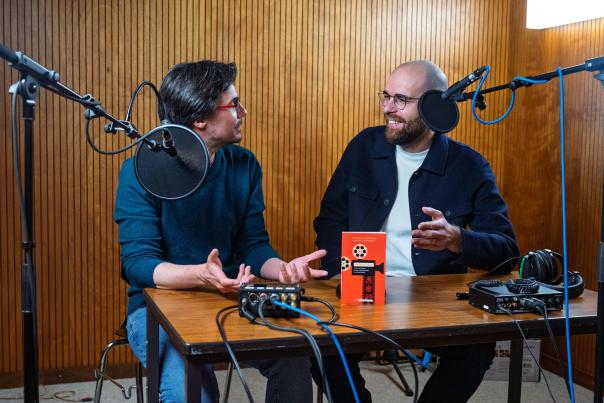
"With the book, we can expand on the podcast's content, providing greater consistency and scientific references," explains Benoit Vanderose, professor in the Faculty of Computer Science.
This new book is aimed at three audiences:
- Those who want to better understand digital technology without jargon
- Film buffs curious to see their favorite works from a different angle
- Teachers and trainers looking for concrete materials to discuss digital technology in the classroom
Digital sessions at UNamur and a research project
In addition to the Pop-Code podcast and the book Cinématech, Benoit Vanderose and Anthony Simonofski's project also takes the form of "digital sessions" organized at UNamur. What's on the program? Films followed by discussions with experts to understand the challenges of digital technology and stimulate collective reflection. In this project, Anthony Simonofski and Benoit Vanderose are joined by Anne-Sophie Collard and Fanny Barnabé. Next event? February 12 for a screening of I, Daniel Blake (Ken Loach) to talk about digital inclusion!
Also worth noting on the same theme: the ongoing research project - https://arc-projects.unamur.be/di-fic
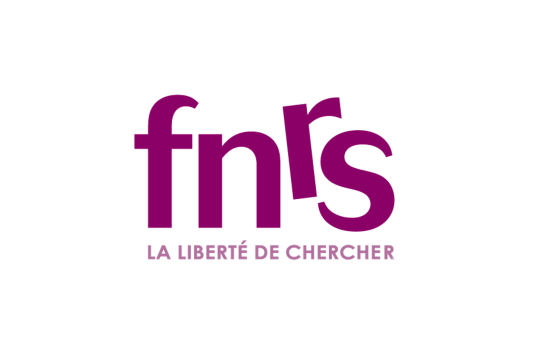
28 new research projects funded by the FNRS
28 new research projects funded by the FNRS
The F.R.S.-FNRS has just published the results of its various 2025 calls for proposals. These include the "Credits & Projects" and "WelCHANGE" calls, as well as the "FRIA" (Fund for Research Training in Industry and Agriculture) and "FRESH" (Fund for Research in the Humanities) calls, which aim to support doctoral theses. What are the results for UNamur? Twenty-eight projects have been selected, demonstrating the quality and richness of research at UNamur.
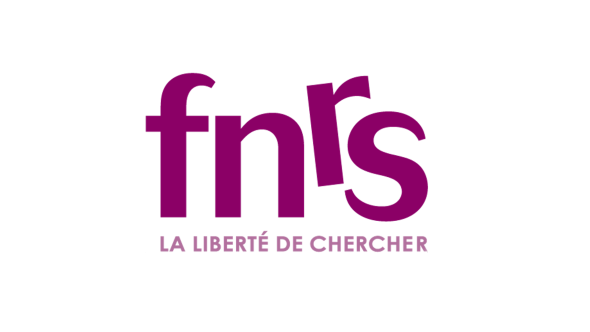
The "Credits & Projects" call for proposals resulted in 12 grants being awarded for ambitious new projects. These include two "equipment" grants, eight "research credits (CDR)" grants, and two "research projects (PDR)" grants, one of which is in collaboration with the ULB. The FRIA call for doctoral research support will fund eleven doctoral scholarships and the FRESH call will fund three.
Two prestigious Scientific Impulse Mandates (MIS) were also obtained. This three-year funding supports young permanent researchers who wish to develop an original and innovative research program by acquiring scientific autonomy within their department.
We would also like to highlight the two projects funded under the "WelCHANGE" call, a funding instrument for research projects with potential societal impact, led by a principal investigator in the humanities and social sciences.
Detailed results
Call for Equipment
- Xavier De Bolle, Narilis Institute, Co-promoter in collaboration with UCLouvain
- Luca Fusaro, NISM Institute
Call for Research Grants (CDR)
- Marc Hennequart, NARILIS Institute
- Nicolas Gillet, NARILIS Institute
- Jean-Yves Matroule, NARILIS Institute
- Patricia Renard, NARILIS Institute
- Francesco Renzi, NARILIS Institute
- Stéphane Vincent, NISM Institute
- Laurence Meurant, NaLTT Institute
- Emma-Louise Silva, NaLTT Institute
Call for Research Projects (PDR)
- Jérémy Dodeigne, Transitions Institute, Co-supervisor in collaboration with ULB
- Luc Henrard, NISM Institute; Co-supervisor: Yoann Olivier, NISM Institute
Fund for Training in Research in Industry and Agriculture (FRIA)
- Emma Bongiovanni - Supervisor: Catherine Michaux, NISM Institute
- Simon Chabot - Supervisor: Carine Michiels, Narilis Institute; Co-supervisor: Anne-Catherine Heuskin, Narilis Institute
- Lee Denis - Supervisor: Muriel Lepère, ILEE Institute
- Maé Desclez - Supervisor: Johan Yans, ILEE Institute; Co-supervisor: Hamed Pourkhorsandi (University of Toulouse)
- Pierre Lombard - Supervisor: Benoît Muylkens, Narilis Institute; Co-supervisor: Damien Coupeau, Narilis Institute
- Amandine Pecquet - Supervisor: Nicolas Gillet, Narilis Institute; Co-supervisor: Damien Coupeau, Narilis Institute
- Kilian Petit - Supervisor: Henri-François Renard, Narilis Institute; Co-supervisor: Xavier De Bolle, Narilis Institute
- Simon Rouxhet - Supervisor: Catherine Michaux, NISM Institute; Co-supervisor: Nicolas Gillet, Narilis Institute
- William Soulié - Supervisor: Yoann Olivier, NISM Institute
- Elisabeth Wanlin - Supervisor: Xavier De Bolle, Narilis Institute
- Laura Willam - Supervisor: Frédérik De Laender, ILEE Institute
Fund for Research in the Humanities (FRESH)
- Louis Droussin - Supervisor: Arthur Borriello, Transitions Institute; Co-supervisor: Vincent Jacquet, Transitions Institute
- Nicolas Larrea Avila - Supervisor: Guilhem Cassan, DeFIPP Institute
- Victor Sluyters – Supervisor: Wafa Hammedi, NADI Institute
- Amandine Leboutte - Co-supervisor: Erika Wauthia (UMons); Co-supervisor: Cédric Vanhoolandt, IRDENa Institute.
Scientific Impulse Mandate (MIS)
- Charlotte Beaudart, Narilis Institute
- Eli Thoré ILEE Institute
WelCHANGE Call
- Nathalie Burnay Transitions Institute, in collaboration with UCLouvain
- Catherine Guirkinger, DeFIPP Institute
Congratulations to all!
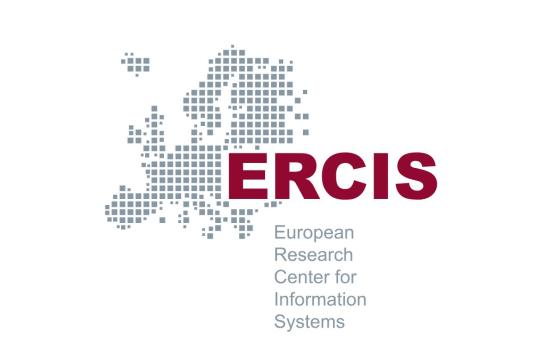
UNamur joins ERCIS, Europe's leading information systems network
UNamur joins ERCIS, Europe's leading information systems network
The University of Namur takes another step forward in its commitment to supporting digital transformation. It is joining the prestigious European Research Center for Information Systems (ERCIS) network as a Partner Institution, via the MINDIT research center (Management de l'Information et Transformation Numérique).

The ERCIS network brings together universities and companies from 25 - mainly European - countries around a common goal: to advance information systems research and meet the challenges of digital transformation. To achieve this, the ERCIS network emphasizes collaborative research, innovation and knowledge sharing.

Joining ERCIS is a fine mark of recognition for the expertise developed by MINDIT and a fantastic opportunity to nurture our research and teaching with an international dimension.
In practical terms, this membership paves the way for training opportunities for MINDIT researchers and PhD students: networking events, annual workshops, summer school or PhD Colloquium. It also creates bridges to develop partnerships at the level of academic programs.
Finally, ERCIS relies on a corporate advisory board, guaranteeing synergy between research and field practices.
MINDIT Research Center
Since 2024, the MINDIT Research Center (NaDI) has been developing expertise in information systems, a field of research at the intersection of computer science and management. MINDIT's work explores the potential of new technologies (AI, Internet of Things, augmented reality, big data...) with the aim of meeting the concrete needs of the business world and public organizations. MINDIT brings together several academics such as Corentin Burnay (director), Isabelle Linden, Stéphane Faulkner and Annick Castiaux.
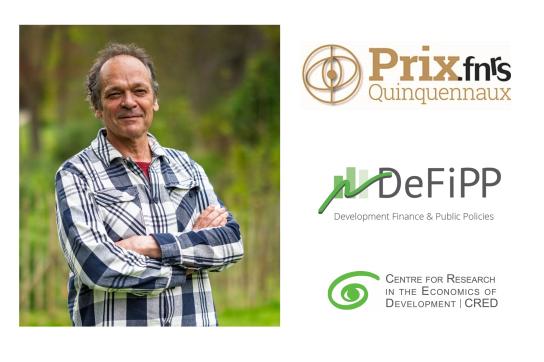
A prestigious FNRS prize in the social sciences for Professor Jean-Marie Baland
A prestigious FNRS prize in the social sciences for Professor Jean-Marie Baland
The FNRS has awarded the five-year Ernest-John Solvay Prize in the Social Sciences to Jean-Marie Baland, Professor in the Department of Economics at UNamur's EMCP Faculty and co-founder of the DeFiPP Institute's Centre de Recherche en Economie du Développement (CRED). A major accolade for a career devoted to the study of poverty, informal institutions and sustainable development.
.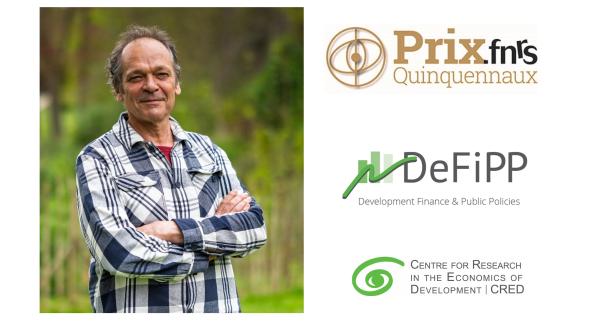
The five-year Ernest-John Solvay Prize, one of the FNRS's most prestigious honors, was awarded this November 24, 2025 to Jean-Marie Baland, professor in the Department of Economics at the University of Namur since 1991. The prize, awarded every five years, recognizes researchers whose work has marked their discipline by its originality and impact.
"Jean-Marie Baland combines theoretical rigor with field studies conducted in countries such as India, Nepal, Kenya and Chile. His research tackles key issues such as economic development, poverty reduction and environmental protection," emphasizes the FNRS jury.
Internationally recognized expertise
As a specialist in less developed countries, Jean-Marie Baland has devoted his work to the analysis of informal institutions, a subject for which he was awarded an ERC Advanced Grant in 2009. His research also explores the determinants of deforestation, the consequences of poverty, and more recently, the causes of infant mortality in South Asia, or domestic violence.
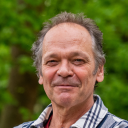
The central question of my research is to understand how groups organize themselves to manage decision-making. Who benefits? Who is harmed? What impact does it have? I've tackled this theme in a variety of ways, using a wide range of case studies. In Kenya, for example, I studied how a group of women in a shantytown organized themselves to build up collective savings to meet their needs. More recently, I've been studying how decision-making works within couples in Europe. Today, I'm working with my colleague Catherine Guirkinger (EMCP Faculty, Department of Economics) on the question of female emancipation and its impact on domestic violence: does it reduce or increase it, and if so, why? All these questions are analyzed using an interdisciplinary method, with approaches drawn from statistical, mathematical and economic models, and social science methods involving field surveys.
.
The desire to understand the world
What's always motivated him?
"The desire to understand the world. My motivation in my research has always been to produce knowledge before wanting it to have a societal impact. The usefulness of research is of course important, but personally it's not what drives me forward. Of course, the results of my research are regularly used to shape public policy, for example. But that's not an end in itself for my work as a researcher ", he stresses.
Jean-Marie Baland's academic career has been studded with prestigious distinctions: Chaire Francqui (2008), Distinguished Fellow Award at Harvard (2007), member of the Academia Europaea (2012)... So many accolades that testify to his scientific influence.
UNamur in the spotlight
But one of his proudest achievements is the creation of UNamur's Center for Research in Development Economics (CRED), founded with Professor Jean-Philippe Platteau. Jean-Marie Baland is a member of the Centre de recherchéche en économie du développement (CRED). A center now internationally recognized for its expertise in development economics, applied microeconomics and environmental economics, contributing to research with a strong societal impact. "The CRED today includes five academics and some fifteen researchers," says Jean-Marie Baland. The economist is also one of the founders of the Master of Specialization in Development Economics .
To the generation of future economists, Jean-Marie Baland addresses this wish:
"Interested in fields that make sense to you! And work as part of a team, even with people who think differently from you. For me, this experience of human interaction has been a very rich experience," he concludes.
A prestigious ceremony
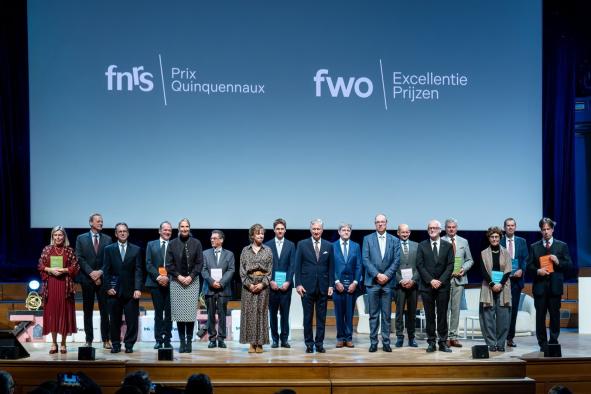
These prestigious prizes, awarded every five years by the FNRS, were presented this November 24, 2025 by King Philippe to one researcher and five researchers from the Wallonia-Brussels Federation. They confirm the international recognition and crown the exceptional careers of these scientists, in all disciplines. The Excellentieprijzen of the FWO, Flanders' equivalent of the FNRS, were also awarded on November 24 by His Majesty the King. At the ceremony, Véronique Halloin, Secretary General of the FNRS, congratulated the winners, thanking the 42 members of the international juries, as well as the sponsors who make these awards possible. She also spoke of "essential issues for scientific research and society as a whole", insisting on the need "to maintain the level of funding for fundamental research, to keep its full place for strategic research but also for the human and social sciences."
Press coverage
- Listen to the podcast produced by DailyScience featuring an interview with Jean-Marie Baland.
- Download the FNRS press release.

Twenty films to understand digital technology: a fun challenge taken up by two experts from UNamur
Twenty films to understand digital technology: a fun challenge taken up by two experts from UNamur
Terminator to talk about AI? Wall-E to talk about technological dependence? The Truman Show to discuss social media? In a new book, two professors from UNamur, Anthony Simonofski (digital transformation—EMCP Faculty—NaDI Institute) and Benoît Vanderose (software engineering—Faculty of Computer Science—NaDI Institute), take readers on a journey at the crossroads of digital technology and cinematic imagination.

Their book "Cinématech - Twenty Works to Understand Digital Technology" is primarily educational in nature, as it allows readers to better understand digital technology and its challenges. But the originality of the approach chosen by the two authors makes it both entertaining and informative.
"The idea is simple: use 20 films and series to illustrate the history of digital technology, three important technologies (AI, robotics, XR) and their challenges. To do this, we start with Terminator, Her, Wall-E, Minority Report, and many others to make these subjects accessible," explains Anthony Simonofski, Professor in the Faculty of Economics, Management, Political Science, and Communication (EMCP).
Published by the Royal Academy of Sciences, Letters, and Fine Arts of Belgium, the book is an extension of the Pop-Code podcast produced by the two experts and film buffs. In it, they explore the use of pop culture to educate people about digital technology, while examining its challenges and limitations.

"With the book, we can expand on the podcast's content, providing greater consistency and scientific references," explains Benoit Vanderose, professor in the Faculty of Computer Science.
This new book is aimed at three audiences:
- Those who want to better understand digital technology without jargon
- Film buffs curious to see their favorite works from a different angle
- Teachers and trainers looking for concrete materials to discuss digital technology in the classroom
Digital sessions at UNamur and a research project
In addition to the Pop-Code podcast and the book Cinématech, Benoit Vanderose and Anthony Simonofski's project also takes the form of "digital sessions" organized at UNamur. What's on the program? Films followed by discussions with experts to understand the challenges of digital technology and stimulate collective reflection. In this project, Anthony Simonofski and Benoit Vanderose are joined by Anne-Sophie Collard and Fanny Barnabé. Next event? February 12 for a screening of I, Daniel Blake (Ken Loach) to talk about digital inclusion!
Also worth noting on the same theme: the ongoing research project - https://arc-projects.unamur.be/di-fic

28 new research projects funded by the FNRS
28 new research projects funded by the FNRS
The F.R.S.-FNRS has just published the results of its various 2025 calls for proposals. These include the "Credits & Projects" and "WelCHANGE" calls, as well as the "FRIA" (Fund for Research Training in Industry and Agriculture) and "FRESH" (Fund for Research in the Humanities) calls, which aim to support doctoral theses. What are the results for UNamur? Twenty-eight projects have been selected, demonstrating the quality and richness of research at UNamur.

The "Credits & Projects" call for proposals resulted in 12 grants being awarded for ambitious new projects. These include two "equipment" grants, eight "research credits (CDR)" grants, and two "research projects (PDR)" grants, one of which is in collaboration with the ULB. The FRIA call for doctoral research support will fund eleven doctoral scholarships and the FRESH call will fund three.
Two prestigious Scientific Impulse Mandates (MIS) were also obtained. This three-year funding supports young permanent researchers who wish to develop an original and innovative research program by acquiring scientific autonomy within their department.
We would also like to highlight the two projects funded under the "WelCHANGE" call, a funding instrument for research projects with potential societal impact, led by a principal investigator in the humanities and social sciences.
Detailed results
Call for Equipment
- Xavier De Bolle, Narilis Institute, Co-promoter in collaboration with UCLouvain
- Luca Fusaro, NISM Institute
Call for Research Grants (CDR)
- Marc Hennequart, NARILIS Institute
- Nicolas Gillet, NARILIS Institute
- Jean-Yves Matroule, NARILIS Institute
- Patricia Renard, NARILIS Institute
- Francesco Renzi, NARILIS Institute
- Stéphane Vincent, NISM Institute
- Laurence Meurant, NaLTT Institute
- Emma-Louise Silva, NaLTT Institute
Call for Research Projects (PDR)
- Jérémy Dodeigne, Transitions Institute, Co-supervisor in collaboration with ULB
- Luc Henrard, NISM Institute; Co-supervisor: Yoann Olivier, NISM Institute
Fund for Training in Research in Industry and Agriculture (FRIA)
- Emma Bongiovanni - Supervisor: Catherine Michaux, NISM Institute
- Simon Chabot - Supervisor: Carine Michiels, Narilis Institute; Co-supervisor: Anne-Catherine Heuskin, Narilis Institute
- Lee Denis - Supervisor: Muriel Lepère, ILEE Institute
- Maé Desclez - Supervisor: Johan Yans, ILEE Institute; Co-supervisor: Hamed Pourkhorsandi (University of Toulouse)
- Pierre Lombard - Supervisor: Benoît Muylkens, Narilis Institute; Co-supervisor: Damien Coupeau, Narilis Institute
- Amandine Pecquet - Supervisor: Nicolas Gillet, Narilis Institute; Co-supervisor: Damien Coupeau, Narilis Institute
- Kilian Petit - Supervisor: Henri-François Renard, Narilis Institute; Co-supervisor: Xavier De Bolle, Narilis Institute
- Simon Rouxhet - Supervisor: Catherine Michaux, NISM Institute; Co-supervisor: Nicolas Gillet, Narilis Institute
- William Soulié - Supervisor: Yoann Olivier, NISM Institute
- Elisabeth Wanlin - Supervisor: Xavier De Bolle, Narilis Institute
- Laura Willam - Supervisor: Frédérik De Laender, ILEE Institute
Fund for Research in the Humanities (FRESH)
- Louis Droussin - Supervisor: Arthur Borriello, Transitions Institute; Co-supervisor: Vincent Jacquet, Transitions Institute
- Nicolas Larrea Avila - Supervisor: Guilhem Cassan, DeFIPP Institute
- Victor Sluyters – Supervisor: Wafa Hammedi, NADI Institute
- Amandine Leboutte - Co-supervisor: Erika Wauthia (UMons); Co-supervisor: Cédric Vanhoolandt, IRDENa Institute.
Scientific Impulse Mandate (MIS)
- Charlotte Beaudart, Narilis Institute
- Eli Thoré ILEE Institute
WelCHANGE Call
- Nathalie Burnay Transitions Institute, in collaboration with UCLouvain
- Catherine Guirkinger, DeFIPP Institute
Congratulations to all!

UNamur joins ERCIS, Europe's leading information systems network
UNamur joins ERCIS, Europe's leading information systems network
The University of Namur takes another step forward in its commitment to supporting digital transformation. It is joining the prestigious European Research Center for Information Systems (ERCIS) network as a Partner Institution, via the MINDIT research center (Management de l'Information et Transformation Numérique).

The ERCIS network brings together universities and companies from 25 - mainly European - countries around a common goal: to advance information systems research and meet the challenges of digital transformation. To achieve this, the ERCIS network emphasizes collaborative research, innovation and knowledge sharing.

Joining ERCIS is a fine mark of recognition for the expertise developed by MINDIT and a fantastic opportunity to nurture our research and teaching with an international dimension.
In practical terms, this membership paves the way for training opportunities for MINDIT researchers and PhD students: networking events, annual workshops, summer school or PhD Colloquium. It also creates bridges to develop partnerships at the level of academic programs.
Finally, ERCIS relies on a corporate advisory board, guaranteeing synergy between research and field practices.
MINDIT Research Center
Since 2024, the MINDIT Research Center (NaDI) has been developing expertise in information systems, a field of research at the intersection of computer science and management. MINDIT's work explores the potential of new technologies (AI, Internet of Things, augmented reality, big data...) with the aim of meeting the concrete needs of the business world and public organizations. MINDIT brings together several academics such as Corentin Burnay (director), Isabelle Linden, Stéphane Faulkner and Annick Castiaux.

A prestigious FNRS prize in the social sciences for Professor Jean-Marie Baland
A prestigious FNRS prize in the social sciences for Professor Jean-Marie Baland
The FNRS has awarded the five-year Ernest-John Solvay Prize in the Social Sciences to Jean-Marie Baland, Professor in the Department of Economics at UNamur's EMCP Faculty and co-founder of the DeFiPP Institute's Centre de Recherche en Economie du Développement (CRED). A major accolade for a career devoted to the study of poverty, informal institutions and sustainable development.
.
The five-year Ernest-John Solvay Prize, one of the FNRS's most prestigious honors, was awarded this November 24, 2025 to Jean-Marie Baland, professor in the Department of Economics at the University of Namur since 1991. The prize, awarded every five years, recognizes researchers whose work has marked their discipline by its originality and impact.
"Jean-Marie Baland combines theoretical rigor with field studies conducted in countries such as India, Nepal, Kenya and Chile. His research tackles key issues such as economic development, poverty reduction and environmental protection," emphasizes the FNRS jury.
Internationally recognized expertise
As a specialist in less developed countries, Jean-Marie Baland has devoted his work to the analysis of informal institutions, a subject for which he was awarded an ERC Advanced Grant in 2009. His research also explores the determinants of deforestation, the consequences of poverty, and more recently, the causes of infant mortality in South Asia, or domestic violence.

The central question of my research is to understand how groups organize themselves to manage decision-making. Who benefits? Who is harmed? What impact does it have? I've tackled this theme in a variety of ways, using a wide range of case studies. In Kenya, for example, I studied how a group of women in a shantytown organized themselves to build up collective savings to meet their needs. More recently, I've been studying how decision-making works within couples in Europe. Today, I'm working with my colleague Catherine Guirkinger (EMCP Faculty, Department of Economics) on the question of female emancipation and its impact on domestic violence: does it reduce or increase it, and if so, why? All these questions are analyzed using an interdisciplinary method, with approaches drawn from statistical, mathematical and economic models, and social science methods involving field surveys.
.
The desire to understand the world
What's always motivated him?
"The desire to understand the world. My motivation in my research has always been to produce knowledge before wanting it to have a societal impact. The usefulness of research is of course important, but personally it's not what drives me forward. Of course, the results of my research are regularly used to shape public policy, for example. But that's not an end in itself for my work as a researcher ", he stresses.
Jean-Marie Baland's academic career has been studded with prestigious distinctions: Chaire Francqui (2008), Distinguished Fellow Award at Harvard (2007), member of the Academia Europaea (2012)... So many accolades that testify to his scientific influence.
UNamur in the spotlight
But one of his proudest achievements is the creation of UNamur's Center for Research in Development Economics (CRED), founded with Professor Jean-Philippe Platteau. Jean-Marie Baland is a member of the Centre de recherchéche en économie du développement (CRED). A center now internationally recognized for its expertise in development economics, applied microeconomics and environmental economics, contributing to research with a strong societal impact. "The CRED today includes five academics and some fifteen researchers," says Jean-Marie Baland. The economist is also one of the founders of the Master of Specialization in Development Economics .
To the generation of future economists, Jean-Marie Baland addresses this wish:
"Interested in fields that make sense to you! And work as part of a team, even with people who think differently from you. For me, this experience of human interaction has been a very rich experience," he concludes.
A prestigious ceremony

These prestigious prizes, awarded every five years by the FNRS, were presented this November 24, 2025 by King Philippe to one researcher and five researchers from the Wallonia-Brussels Federation. They confirm the international recognition and crown the exceptional careers of these scientists, in all disciplines. The Excellentieprijzen of the FWO, Flanders' equivalent of the FNRS, were also awarded on November 24 by His Majesty the King. At the ceremony, Véronique Halloin, Secretary General of the FNRS, congratulated the winners, thanking the 42 members of the international juries, as well as the sponsors who make these awards possible. She also spoke of "essential issues for scientific research and society as a whole", insisting on the need "to maintain the level of funding for fundamental research, to keep its full place for strategic research but also for the human and social sciences."
Press coverage
- Listen to the podcast produced by DailyScience featuring an interview with Jean-Marie Baland.
- Download the FNRS press release.
Agenda
Methods" seminar | Computational approaches to meaning change
"Methods" is a series of seminars organized by the Institut Transitions at the University of Namur with the aim of fostering interdisciplinary collaboration and knowledge exchange. All seminars take place in a hybrid format.
Orator: Barbara McGilivray - Senior Lecturer in Digital and Computational Humanities at King's College London
Semantic change, i.e. the evolution of word meanings over time, offers crucial information about historical, cultural and linguistic processes. Language acts as a mirror of societal change, reflecting evolving values, norms and technological advances. Understanding how the meaning of words evolves enables us to trace these transformations and gain a deeper understanding of our distant and recent past.
This seminar explores how computational methods are revolutionizing our ability to analyze semantic change in historical texts, addressing a major challenge in the field of digital humanities. While advanced computational methods enable us to analyze vast datasets and uncover previously inaccessible patterns, few natural language processing algorithms fully take into account the dynamic nature of language, particularly semantics, which is essential for research in the humanities. As AI systems develop to better understand the historical context and dynamics of language, human annotation and interpretation remain essential to capture the nuances of language and its cultural context.
In this presentation, I will show how computational and human-centered approaches can be effectively combined to examine semantic change and its links to cultural and technological developments. I will present examples illustrating how semantic change can be analyzed across temporal, cultural and textual dimensions.
"Methods "seminars
The Methods Seminar is a series of seminars organized at the University of Namur with the aim of fostering interdisciplinary collaboration and knowledge exchange. All seminars take place in a hybrid format.
This seminar series focuses on advanced methodological approaches, particularly in the fields of natural language processing (NLP), artificial intelligence (AI), video and image analysis, and multimodal analysis.
To stay informed about details of upcoming seminars, please subscribe to our mailing list below.


